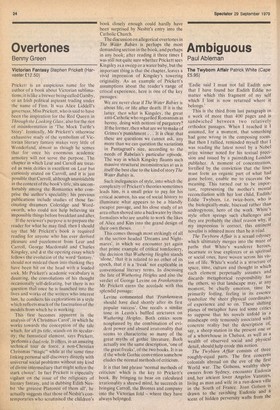Ambiguous
Paul Ableman
The Twyborn Affair Patrick White (Cape £5.95) 'Eadie said I must not fail Eadith now that I have found her Eadith Eddie no matter which this fragment of my self which I lost is now returned where it belongs.'
This is the third from last paragraph in a work of more than 400 pages and is sandwiched between two relatively orthodox passages. When I reached it I assumed, for a moment, that something had gone wrong in the composing room. But then I rallied, reminded myself that I was reading the latest novel by a Nobel prize winner noted for his textual precision and issued by a painstaking London publisher. A moment of concentration, fortified by the conviction that the lines must form an organic part of what had gone before, enable me to excavate the meaning. This turned out to be important, representing the mother's mental reconciliation with her lost child, Eadith/ Eddie Twyborn, i.e. twice-born, who is the biologically-male, bisexual rather than androgynous, hero of the work. White's style often springs such challenges and they are probably the chief reason why, if my impression is correct, this eminent novelist is admired more than he is rdad.
The Twyborn Affair is a sexual odyssey which ultimately merges into the maze Of paths that White's wanderer heroes, incarnate as true explorers or as spiritual or social ones, have woven 'across his vision of life. White's world is a structure of space, time, culture and thought in which each element perpetually assumes and discards metaphorical responsibility for the others, so that landscape may, at any moment, be chiefly emotion, time be primarily feeling, feeling in its essence symbolize the sheer physical coordinates of experience and so on. These shifting planes of metaphor have led some critics to suppose that his novels unfold in a mindscape only tenuously associated with concrete reality but the description of, say, a sheep station in the present one or of a whorehouse in Chelsea, as well as a wealth of observed social and physical detail, should help erode this notion. The Twyborn Affair consists of three roughly-equal parts. The first concerns colonials abroad on the eve of the first World war. The Golsons, wealthy shopowners from Sydney, encounter Eudoxia and; her ancient lover Angelos Vatatzes, living as man and wife in a run-down villa in the South of France. Joan Golson is drawn to the ravishing Eudoxia and a scent of hidden perversity wafts from the Page even before we learn that Joan's best friend back home is Eudoxia's mother or begin to suspect that there is something ambiguous about the young 'woman'. The bizarre couple flee the unwanted attentions of the Australian matron but this puts too great a strain on Vatatzes's heart and the old Greek perishes in a dingy pension. In the next section, Eudoxia, now calling himself Eddy again and a DSO after service as an officer at the front, returns to Australia, first to an uneasy reunion with his family and then to a period of retreat on a sheep station where raw toil is punctuated by scented embraces with the lady of the house and sweaty ones With the foreman. Disenchanted with Arcady, which has inevitably failed to heal his psychic schism, Eddy allows his female alter-ego to surface once more and she is given a last gallop, in the final section, as the madam of a splendid brothel in Chelsea. It is this final section that strains credulity most. Transvestites have, of course, pursued extraordinary careers in borrowed gender but Eadith, the bawd, especially in her relations with a duke who, rather implausibly, adores her, oversteps the bounds of the possible. It matters little. The book is not, and is Probably not intended to be, naturalistic. But nor is it allegory. If, in its assertion Of the triumphant lark of swinging between the sexes, it resembles Virginia Woolf's Orlando, in its bleak acknowledgement of impotence in the face of suffering, brevity and merely arbitrary meaning, its vision approaches the tragic Perspectives of Dostoevsky or the Shakespeare of Hamlet and Lear.
And yet in the last resort this work, like Patrick White's other novels, cannot be considered tragedy because the term has come to imply a moral order and anthropocentricity. Man, loved or hated, despised or lauded, must be at the focus of the narrative. But in Patrick White's works man is merely a constituent of nature and the author seems magisterially indifferent to the course of events. The tone stems not so much from amorality as from a region beyond morality and this Casts a peculiar chill over the books. `He had almost reached Eadie's hotel When he noticed the East blazing with a Perverse sunset, if not fiery razzle-dazzle, heard the chuffing of his own heart, a clangour of racing engines, the thump and Crump of history becoming unstable `Blazing with a perverse sunset' is a superb evocation of the fire-blitz on London, immediately torpedoed by the bathos of 'fiery razzle-dazzle'. It is Perhaps as well that White's prose is so erratic. If it consistently sustained its Magnificent best, we would all be lured helplessly to its glittering peaks. As it is, those of us who need what may indeed bY only the illusion that man matters in the cosmos can flee avidly back to the hearths of Tolstoy or Nabokov or even the modest warmth of Henry James.



































 Previous page
Previous page